NURSING PNN101
Marshalltown Community College
Página 2 fuera de 28 resultados
Ordenador por
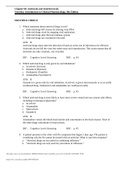
-
NURSING PNN101 Chapter 06: Antivirals and Antiretrovirals Visovsky: Introduction to Clinical Pharmacology, 9th Edition
- Examen • 9 páginas • 2022
- Disponible en paquete
-
- $8.49
- + aprende más y mejor
1. Which statement about antiviral drugs is true? a. Antiviral drugs kill viruses by altering viral DNA. b. Antiviral drugs work by stopping viral replication. c. Antiviral drugs alter the host immune system. d. Antiviral drugs are considered virucidal. ANS: B Antiviral drugs must enter the infected cell and act at the site of infection to be effective. Antivirals do not kill the virus but rather stop viral reproduction. This action means that all antivirals are only virustatic, not viru...
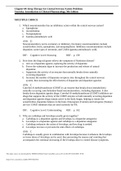
-
NURSING PNN101Chapter 09: Drug Therapy for Central Nervous System Problems Visovsky: Introduction to Clinical Pharmacology, 9th Edition
- Examen • 7 páginas • 2022
- Disponible en paquete
-
- $8.49
- + aprende más y mejor
Chapter 09: Drug Therapy for Central Nervous System Problems Visovsky: Introduction to Clinical Pharmacology, 9th Edition MULTIPLE CHOICE 1. Which neurotransmitter has an inhibitory action within the central nervous system? a. Epinephrine b. Acetylcholine c. Norepinephrine d. Gamma-aminobutyric acid ANS: D Neurotransmitters can be excitatory or inhibitory. Excitatory neurotransmitters include acetylcholine (Ach), epinephrine, and norepinephrine. Inhibitory neurotransmitters include do...
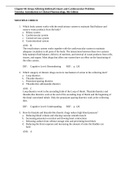
-
Chapter 08: Drugs Affecting theRenal/Urinary and Cardiovascular Problems Visovsky: Introduction to Clinical Pharmacology, 9th Edition
- Examen • 12 páginas • 2022
- Disponible en paquete
-
- $9.49
- + aprende más y mejor
1. Which body system works with the renal/urinary system to maintain fluid balance and remove waste products from the body? a. Biliary system b. Cardiovascular system c. Central nervous system d. Gastrointestinal system ANS: B The renal/urinary system works together with the cardiovascular system to maintain adequate circulation to all parts of the body. The interactions between these two systems help maintain fluid balance, delivery of nutrients, and removal of waste products from cell...
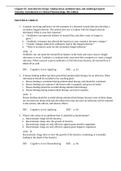
-
NURSING PNN101>Chapter 05: Anti-infective Drugs: Antibacterial, Antitubercular, and Antifungal Agents Visovsky: Introduction to Clinical Pharmacology, 9th Edition
- Examen • 12 páginas • 2022
- Disponible en paquete
-
- $9.49
- + aprende más y mejor
Chapter 05: Anti-infective Drugs: Antibacterial, Antitubercular, and Antifungal Agents Visovsky: Introduction to Clinical Pharmacology, 9th Edition MULTIPLE CHOICE 1. A patient receiving antibiotics for the treatment of a bacterial wound infection develops a secondary fungal infection. The patient asks you to explain why the fungal infection developed. What is your best response? a. “Antibiotics can upset the balance of normal flora and allow yeast or fungus to grow.” b. “Antibioti...
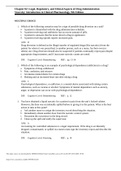
-
NURSING PNN101 Chapter 02: Legal, Regulatory, and Ethical Aspects of Drug Administration Visovsky: Introduction to Clinical Pharmacology, 9th Edition
- Examen • 5 páginas • 2022
- Disponible en paquete
-
- $8.49
- + aprende más y mejor
Chapter 02: Legal, Regulatory, and Ethical Aspects of Drug Administration Visovsky: Introduction to Clinical Pharmacology, 9th Edition MULTIPLE CHOICE 1. Which of the following scenarios may be a sign of possible drug diversion on a unit? a. A patient is dissatisfied with the drug administration schedule. b. A patient receiving oral antibiotics has an excess amount of pills. c. A patient is unaware that the nurse mixed a drug in applesauce. d. A patient receiving opioids reports increased...
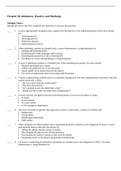
-
NURSING PNN101>Chapter 20. Admission, Transfer, and Discharge
- Examen • 21 páginas • 2022
- Disponible en paquete
-
- $9.49
- + aprende más y mejor
Multiple Choice Identify the choice that best completes the statement or answers the question. ____ 1. A nurse appropriately recognizes that a patient will develop his or her initial impression of the nurse during the 1. Teaching process. 2. Discharge process. 3. Admission process. 4. Implementation process. ____ 2. When admitting a patient to a hospital unit, a nurse demonstrates a caring demeanor by 1. Smiling and speaking kindly. 2. Exhibiting tense body language and frowning. 3. I...
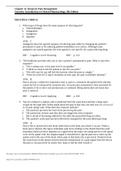
-
NURSING PNN101 Chapter 11: Drugs for Pain Management Visovsky: Introduction to Clinical Pharmacology, 9th Edition
- Examen • 6 páginas • 2022
- Disponible en paquete
-
- $8.49
- + aprende más y mejor
1. What types of drugs have the main purpose of relieving pain? a. Anticholinergics b. Antagonists c. Analgesics d. Agonists ANS: C Analgesics have the specific purpose of relieving pain either by changing the patient’s perception of pain or by reducing painful stimulation at its source. Although some analgesics are opioid agonists, the term agonist is not specific for a pain-relieving drug. DIF: Cognitive Level: Knowing REF: p. 213 2. The healthcare provider asks you to rate a patie...
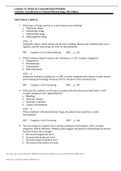
-
Chapter 13: Drugs for Gastrointestinal Problems Vislosky: Introduction to Clinical Pharmacology, 9th Edition
- Examen • 7 páginas • 2022
- Disponible en paquete
-
- $10.49
- + aprende más y mejor
Chapter 13: Drugs for Gastrointestinal Problems Visovsky: Introduction to Clinical Pharmacology, 9th Edition MULTIPLE CHOICE 1. What types of drugs prevent or control nausea and vomiting? a. Antiemetic drugs b. Antimotility drugs c. Antidiarrheal drugs d. Antipropulsion drugs ANS: A Antiemetic drugs control nausea and prevent vomiting. Nausea and vomiting often occur together, and the same drugs are used for both problems. DIF: Cognitive Level: Remembering REF: p. 242 2. Which common...
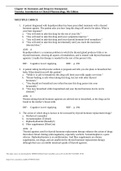
-
Chapter 16: Hormones and Drugs for Osteoporosis Visovsky: Introduction to Clinical Pharmacology, 9th Edition
- Examen • 9 páginas • 2022
- Disponible en paquete
-
- $9.49
- + aprende más y mejor
1. A patient diagnosed with hypothyroidism has been prescribed treatment with a thyroid hormone agonist. The patient asks you how long this drug will need to be taken. What is your best response? a. “You will need to take this drug for the rest of your life.” b. “You will need to take this drug until your symptoms improve.” c. “You will need to take this drug until your thyroid hormone level normalizes.” d. “You will need to take this drug incrementally until you reach the ma...
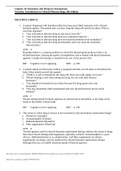
-
Chapter 16: Hormones and Drugs for Osteoporosis Vislosky: Introduction to Clinical Pharmacology, 9th Edition
- Examen • 9 páginas • 2022
- Disponible en paquete
-
- $8.49
- + aprende más y mejor
1. A patient diagnosed with hypothyroidism has been prescribed treatment with a thyroid hormone agonist. The patient asks you how long this drug will need to be taken. What is your best response? a. “You will need to take this drug for the rest of your life.” b. “You will need to take this drug until your symptoms improve.” c. “You will need to take this drug until your thyroid hormone level normalizes.” d. “You will need to take this drug incrementally until you reach the ma...

Ese resumen que acabas de comprar ha hecho muy feliz a alguien. ¿También te pagan semanalmente? ¡Vende tus documentos de estudio en Stuvia! Descubre todo sobre cómo ganar en Stuvia


